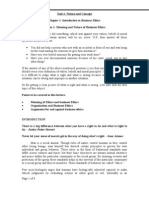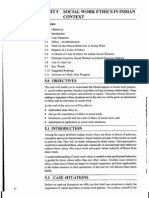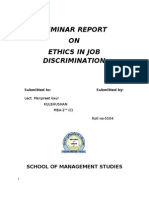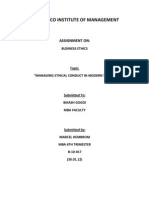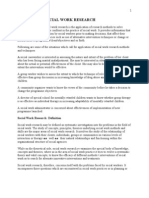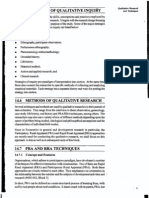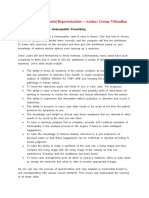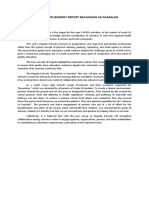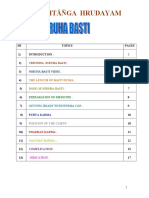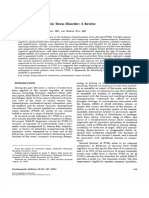Code of Ethics
Code of Ethics
Uploaded by
Jananee RajagopalanCopyright:
Available Formats
Code of Ethics
Code of Ethics
Uploaded by
Jananee RajagopalanOriginal Title
Copyright
Available Formats
Share this document
Did you find this document useful?
Is this content inappropriate?
Copyright:
Available Formats
Code of Ethics
Code of Ethics
Uploaded by
Jananee RajagopalanCopyright:
Available Formats
CODE OF ETHICS K.SATHYAMURTHI, Asst. Prof. MSSW.
AN INTRODUCTION Ethics also called moral philosophy is concerned about what is right and what is wrong. It can be divided into two sections - normative ethics and Meta ethics. Normative ethics deals with the principles we live by. Meta ethics has a larger concern and its deals with the nature and methodology of moral judgments. In other words, it deals with the basis on which decisions should be made. Should the ultimate consequences of the decision, for example be promoting happiness or promoting perfectionism in society? Religious people base their decisions on what they believe to be the will of god and on god's word. As social workers we are interested in ethics so that of relationships with clients, ow colleagues, of superiors and our subordinates are within the framework of social work values. Social work rejects Social Darwinism and utilitarianism. Social work initially emerged in the Western countries including U. S. A. and was therefore influenced by Judeo Christian values. As the profession began to spread to Gulf and other parts of Asia, the religious traditions of these countries also influenced the social work profession in these regions. Social workers are trying to incorporate indigenous values into the profession so that the profession gets better recognition and acceptance from the people. This process will be an extended one, as most post-colonial societies are yet to recover, intellectually and academically, from the colonial experience. Scientific values and methods have also influenced the practice of social work. It may seem strange that social work is influenced by two seemingly contrary values of science and religion. Social work rejects those religious values that advocate that an individual suffers due to other- worldly reasons like god's anger or predestination. It believes that every individual has the capacity to solve his/ her problems if he/she is provided with the necessary resources. Consequently factors that cause an individual's problem or a social problem are identified using scientific methods namely observation, description, classification and explanation. Solutions based on rationality are identified and formulated. The following values are the basis of social work profession - social justice, the dignity and worth of the individual importance of human relationships; integrity, and competence. You must have notice that professionals who deal with the human body, human psyche and human relationships always have a code of conduct. Doctors have code of conduct which they have to follow while they are practicing. Doctors pledge to prescribe only
beneficial treatment, according to their abilities and judgment; to refrain from causing harm or hurt; and to live an exemplary personal and professional life. Lawyers have their own code, which they have to follow when they are interacting with clients, pleading before a judge and questioning witnesses. These codes have evolved over time during which these professions emerged in society. As these professions emerged there were several instances of misuse of these positions by unscrupulous individuals who harmed the professions. The codes were formulated so that behaivour of these professionals are controlled and society's trust in them is not lost. Professions that have ethical codes generally have a body of fellow professionals who are elected by the professional organisation to oversee their implementation. In advanced countries these bodies have wide ranging powers. These include the power to censure the offending member; impose a fine on the member and even revoke the member's license to practice. when one former American President was found guilty of perjury the Bar Association of his home state revoked his license to practice in the court and now he is not allowed to practice law in that state. In India the license of a doctor-actor was revoked by the Medical Council after it was alleged that he had advertised a medicine which did not meet the standards set by the Council. Of course in both these high profile cases there existed a political angle to the problem which lead the respective associations to take such drastic steps. But these examples do show that the ethical codes of professions are a serious matter and that professional bodies are powerful organizations. We shall now specifically take up the social work code of ethics.
NEED FOR ETHICAL BEHAVIOUR IN SOCIAL WORK Social work is a problem solving profession. The social worker comes across varied and complex situations. Ethics help professionals to act morally in difficult situations. The need for such behaviour in social work is important due to the following reasons. Social workers during their interaction with clients and their significant others have to sensitive information: The purpose of the client to share information is to enable the social worker to get better insight into the problem and then help the client to solve the problem. But if the social worker reveals this sensitive information inadvertently or purposely to others helshe will be damaging the client's cause and furthering complicate the problem. Strict observance of the principle of confidentiality is necessary in this situation.
Social workers are often in situations wltere their decisions can causeserious damage to the client: Social workers often deal with clients who are facing serious problems. Their personalities are often disintegrated and they may be vulnerable to emotional and physical abuse. Even otherwise there is a power relation between the social worker and the client. The case worker has more knowledge and is in greater control of his/ her emotions than the client. This power should not be used to the disadvantage of the client. In some cases the caseworker may unconsciously commit an error which causes damage to the client. The chances for such errors are minimized when the social worker has internalized the social work ethics. Basics of Social Work Social workers occupy positions of nutlzority in governmental and non governmental organisntions: Any position of authority has an element of accountability attached to it. Accountability means 'to give count of. You have been entrusted with certain goods and after use you have to account for what you have used, for what purpose, how and to what effect. Social workers, unlike others have an additional responsibility - they have to see that the human dignity and human self is preserved. Probably no other profession deals with these aspects as directly as social work. A policeman has to only think whether his action would reduce the crime rate and whether he is following the due process of law when he is acting. The lawyer has to only think whether hisher client's interests will be served by hisher actions. A priest has to only worry whether his actions will help hlfill the individual's religious needs. But the social worker's decisions should express concern for human dignity and human self. Social workers are often in positions where they can allocate resources: In most cases, allocating resources to one party means not allocating it to others who are also be needy. This is true of a country like India where scarcity exists almost everywhere. In an adoption center a social worker may be asked whether a particular couple can be allowed to adopt a child. The social worker's opinion will have a bearing on the lives of at least three individuals. Social workers have to preserve professional autonomy: In a democratic country the government is the ultimate authority and it plays an important role in regulating other institutions. But some times this regulation becomes an intrusion into the internal affairs of the professions which is not desirable. If the professionals themselves regulate their affaires, government action becomes unnecessary and their professional autonomy can be preserved. PURPOSE OF A CODE OF ETHICS
We have seen the importance of ethical behaivour in social work. Those countries in which social work has been hlly accepted as a profession by the society, have a code of ethics. A code is a systematic collection of regulations and rules of procedure or conduct. Code of ethics in social work can thus be defined as a set of rulers and regulations that should govern the conduct of the social worker in his/her relationships with hisl her clients, fellow professionals, colleagues, the agency and society in general. According to the National Association of Social Workers, USA (NASW) Code of Ethics serves six purposes: 1) The Code identifies core values on which social work's mission is based. 2) The Code summarizes broad ethical principles that reflect the profession's core values and establishes a set of specific ethical standards that should be used to guide social work practice 3) The Code is designed to help social workers identify relevant considerations when professional obligations codictual or ethical uncertainties arise. 4) The Code provides ethical standards to which the general public can hold the social work profession accountable. 5) The Code socializes practitioners new to the field, to social work's mission, values, ethical principles and ethical standards. 6) The Code articulates standards that the social work profession itself can use to assess whether social workers have engaged in unethical conduct. These codes have been formulated by experts in the profession and presented before the general assembly of the social work association of that country. In the general assembly, the issues are discussed word by word. Different points of view are expressed and debated upon. After such wide ranging discussions and several revisions, the final draft of the code is put to vote and accepted. The broad participation of social workers and the democratic procedure followed by the assembly ensures that the codes receive wide acceptance. It has a substantial influence on the social workers practice in these countries. If anyone is found breaking the code action is taken after a formal inquiry. In India however there exists no association, which commands such authority among the social workers. Some associations, which are basically regional based, have developed a code of ethics <3f their own. However as these associations have limited selected members and exclude a majority of the social workers of the country, their influence on social work practice is limited. The government has also not recognized any body and has not entrusted any one with the authority to regulate social work. Efforts were made to
formulate a Professional Social Workers' Bill that is aimed at regulating the social work practice in the country. However no results have been achieved. Here we have tried to present a model of a code of ethics, which can be used in social work practice in the Indian context. The social workers are encouraged to adhere to these codes even during their training period. As one goes through the code it will be noticed that ultimately it is the responsibility of the individual who has to maintain these standards in his or her behaivour. External agencies can only regulate the social worker's behaviour up to a certain extent. Therefore it is necessary that we internalize these values and make them a part of our personality. Code of Ethics National Association of Social Workers Preamble The primary mission of the social work profession is to enhance human wellbeing and help meet the basic human needs of all people, with particular attention to the needs and empowerment of people who are vulnerable, oppressed, and living in poverty. A historic and defining feature of social work is the professions focus on individual wellbeing in a social context and the wellbeing of society. Fundamental to social work is attention to the environmental forces that create, contribute to, and address problems in living. Social workers promote social justice and social change with and on behalf of clients. Clients is used inclusively to refer to individuals, families, groups, organizations, and communities. Social workers are sensitive to cultural and ethnic diversity and strive to end discrimination, oppression, poverty, and other forms of social injustice. These activities may be in the form of direct practice, community organizing, supervision, consultation administration, advocacy, social and political action, policy development and implementation, education, and research and evaluation. Social workers seek to enhance the capacity of people to address their own needs. Social workers also seek to promote the responsiveness of organizations, communities, and other social institutions to individuals needs and social problems. The mission of the social work profession is rooted in a set of core values. These core values, embraced by social workers throughout the professions history, are the foundation of social works unique purpose and perspective:
service
social justice dignity and worth of the person importance of human relationships integrity Competence.
This constellation of core values reflects what is unique to the social work profession. Core values, and the principles that flow from them, must be balanced within the context and complexity of the human experience. Purpose of the NASW Code of Ethics Professional ethics are at the core of social work. The profession has an obligation to articulate its basic values, ethical principles, and ethical standards. The NASW Code of Ethics sets forth these values, principles, and standards to guide social workers conduct. The Code is relevant to all social workers and social work students, regardless of their professional functions, the settings in
1.2 Professional association
A professional association (also called a professional body, 'professional organization, professional association or professional society) is a non-profit organization seeking to further a particular profession, the interests of individuals engaged in that profession, and the public interest. The roles of these professional associations have been variously defined: "A group of people in a learned occupation who are entrusted with maintaining control or oversight of
the legitimate practice of the occupation;" also a body acting "to safeguard the public interest;" organizations which "represent the interest of the professional practitioners," and so "act to maintain their own privileged and powerful position as a controlling body." Such bodies generally strive to achieve a balance between these two often conflicting mandates. Though professional bodies often act to protect the public by maintaining and enforcing standards of training and ethics in their profession, they often also act like a cartel or a labor union (trade union) for the members of the profession, though this description is commonly rejected by the body concerned. Therefore, in certain dispute situations the balance between these two aims may get tipped more in favor of protecting and defending the professionals than in protecting the public. An example can be used to illustrate this. In a dispute between a lawyer and his/her client or between a patient and his/her doctor, the Law Society of England and Wales or the General Medical Council will inevitably find itself plunged into a conflict of interest in (a) its wish to defend the interests of the client, while also (b) wishing to defend the interests, status and privileges of the professional. It is clearly a tough call for it do both. Many professional bodies are involved in the development and monitoring of professional educational programs, and the updating of skills, and thus perform professional certification to indicate that a person possesses qualifications in the subject area. Sometimes membership of a professional body is synonymous with certification, though not always. Membership of a professional body, as a legal requirement, can in some professions form the primary formal basis for gaining entry to and setting up practice within the profession; see licensure. Many professional bodies also act as learned societies for the academic disciplines underlying their professions. Professional associations There are a number of professional associations for social workers. The purpose of these associations is to provide advocacy, ethical guidance, and other forms of support for their members and social workers in general. Two of these are the International Federation of Social Workers (IFSW) and the International Association of Schools of Social Work (IASSW).
At a national level there are organizations regulating the profession, as well. Some of these are the British Association of Social Workers (United Kingdom), the Australian Association of Social Workers (Australia), the Professional Social Workers' Association (India), the Hellenic Association of Social Workers (Greece) and so forth. The largest membership of professional social workers in the world is the National Association of Social Workers (NASW)[1] with 150,000 members. International Federation of Social Workers The International Federation of Social Workers (IFSW) is an international professional organization for social workers. The society consists of 84 national chapters, divided into five regional groups, and has over 480,000 members. The goal of this body is to promote the profession of social work and the organization of professional social workers to facilitate their work through international cooperation. The current president is David N. Jones of the United Kingdom. History The organization began as the International Permanent Secretariat of Social Workers in Paris in 1928. This group became inactive after the onset of World War II. During the International Conference of Social Work of 1950 in Paris, the organization was reorganized as the International Federation of Social Workers. Originally, seven national social worker organizations agreed to become members. However, this new association was not officially founded until 1956 at the International Conference on Social Welfare in Munich, Germany International Association of Schools of Social Work (IASSW) The International Association of Schools of Social Work (IASSW) is the international association of schools of social work and other institutions of learning. The IASSW promotes the development of social work education throughout the world, develops standards to enhance quality of social work education, encourages international exchange, provides forums for sharing social work research and scholarship, and promotes human rights and social development through policy and advocacy activities. They also work in a consultative role with the United Nations. They host a biennial conference of social work educators called the IASSW Congress and publish a newsletter.
The IASSW was founded in 1928 at the First International Conference of Social Work, held in Paris. It initially comprised 51 schools, mostly in Europe, and was known as the International Committee. Revitalized after World War II, the organization expanded its membership to include a wider range of countries and was renamed the International Association of Schools of Social Work. The association has member schools in all parts of the world; 5 regional organizations in Africa; Asia and the Pacific; Europe; Latin America; and North America and the Caribbean are affiliated with the IASSW and represented on the Board of Directors. British Association of Social Workers (BASW) The British Association of Social Workers (BASW) is the largest professional association of social workers in the United Kingdom.[1] It has created a code of ethics that outlines good social work practice and works to support social workers through education and resources. Headquartered in Birmingham, BASW has regional offices in England (Birmingham), Northern Ireland (Belfast), Scotland (Edinburgh), Wales (Swyddfa Cymru) (Penarth), and North Wales (Cymru Gogledd) (Pwllheli). BASW was formed in 1970 by the amalgamation of the Association of Child Care Officers, the Association of Family Case Workers, the Association of Psychiatric Social Workers, the Association of Social Workers, the Institute of Medical Social Workers, the Moral Welfare Workers' Association, and the Society of Mental Welfare Officers. These were all members of the Standing Conference of Organisations of Social Workers (SCOSW), which had been formed in 1962 to bring together the different branches of the profession and which was wound up on the formation of BASW (the National Association of Probation Officers was also a member, but decided against joining the new association). Australian Association of Social Workers (AASW) The Australian Association of Social Workers (AASW) is the professional representative body of social workers in Australia. It was formed in 1946 at the federal level, although a number of state branches had formed prior to this. The AASW created a code of ethics that governs the conduct of social workers and promotes the interests of social workers in Australia.[1] The Australian Association of Social Workers has a commitment to the international social work community, and is a member of the International Federation of Social Workers (IFSW)
Journal The AASW publishes the quarterly journal Australian Social Work. It publishes research and thinking by social workers on political, economic and social policies and programs and on professional practice and education. It is a professionally edited and refereed journal, led by a national committee of practitioners and academics. AASW Code of Ethics The Australian Association of Social Workers Code of Ethics outlines the organizations view of the role and character of social work. In carrying out their professional tasks and duties, social workers strive to act in ways that give equal priority to respect for human dignity and worth and the pursuit of social justice. This commitment is demonstrated through service to humanity, integrity and competence, which characterise professional social work practice. Social work principles are derived from the values; together, they underpin ethical social work practice. They are further explained as below
Human dignity and worth - Every human being has a unique worth and each person has a right to well-being, selffulfilment and self-determination, consistent with the rights of others. Social justice - Each society has an obligation to pursue social justice, to provide maximum benefit for all its members and to afford them protection from harm. Service to humanity - To meet personal and social needs and to enable people to develop their potential. Integrity - honesty, reliability and impartiality in social work practice. Competence - proficiency in social work practice.
Professional Social Workers' Association (PSWA) The Professional Social Workers' Association (PSWA) is an association of Indian / Tamil Nadu social work professionals, headquartered at Chennai. It is a legally registered entity, formerly known as "Professional Social Workers' Forum" (PSWF).
The Association is functioning since 1985. They are also organizing an annual state level seminar pertaining to current social work challenges and practices.
You might also like
- NASW Social Work Code of EthicsDocument27 pagesNASW Social Work Code of EthicsJananee Rajagopalan100% (1)
- College of Arts and Sciences Name - Ezra Joy J. Villaflor - Date - 04/02/21 - Year/Course - BSED-2 - Student No. - 19-00481Document21 pagesCollege of Arts and Sciences Name - Ezra Joy J. Villaflor - Date - 04/02/21 - Year/Course - BSED-2 - Student No. - 19-00481Louis Fetilo FabunanNo ratings yet
- Nasw Code of Ethics PDFDocument20 pagesNasw Code of Ethics PDFFarris JonesNo ratings yet
- Importance of Ethics in Social WorkDocument11 pagesImportance of Ethics in Social WorkEvangelist Kabaso Sydney100% (7)
- Meaning Nature of Business EthicsDocument8 pagesMeaning Nature of Business EthicsVivek SrivastavaNo ratings yet
- Consumer MovementDocument16 pagesConsumer MovementJananee Rajagopalan75% (56)
- What Is Qualitative ResearchDocument7 pagesWhat Is Qualitative ResearchJananee Rajagopalan100% (2)
- Professional AssociationsDocument5 pagesProfessional AssociationsJananee Rajagopalan50% (2)
- NASW Code of Ethics2017Document36 pagesNASW Code of Ethics2017Erick Burgos100% (1)
- Code of EthicsDocument10 pagesCode of EthicsMarvs EspinaNo ratings yet
- Unit 6Document7 pagesUnit 6dangialisha07No ratings yet
- Business Ethics: Meaning, Sources and Importance: DefinitionsDocument133 pagesBusiness Ethics: Meaning, Sources and Importance: DefinitionsChandra sekhar VallepuNo ratings yet
- Running Head: Social Ethics in The Community 1Document10 pagesRunning Head: Social Ethics in The Community 1Erick OgolaNo ratings yet
- PEDocument175 pagesPEKuntal VasoyaNo ratings yet
- Lesson II. The-WPS OfficeDocument4 pagesLesson II. The-WPS OfficebenbenbensobremisanaNo ratings yet
- Chapter Two: Ethics and Civic VirtueDocument12 pagesChapter Two: Ethics and Civic VirtueÄjú Bíñt ŹãhŕãNo ratings yet
- Moral ReasoningDocument9 pagesMoral Reasoningapi-284600196No ratings yet
- Ethical Levels: - Definition of Law - Historical Development of The Law - The Different Between Law and EthicsDocument11 pagesEthical Levels: - Definition of Law - Historical Development of The Law - The Different Between Law and EthicsAlia Al ZghoulNo ratings yet
- Ethical ConflictDocument8 pagesEthical ConflictFouzia Kamal SarkerNo ratings yet
- Objective of Social WorkDocument9 pagesObjective of Social WorkAnil MenzNo ratings yet
- Work EthicsDocument14 pagesWork EthicsArshad Mohd100% (1)
- Submitted By: Submitted To: Icitss-Itt-16Document16 pagesSubmitted By: Submitted To: Icitss-Itt-16Rahil NarangNo ratings yet
- Chapter 1: Fundamentals of EthicsDocument22 pagesChapter 1: Fundamentals of EthicsAliah CyrilNo ratings yet
- Code of Ethics: National Association of Social WorkersDocument23 pagesCode of Ethics: National Association of Social WorkersDharma Reddy PashapuNo ratings yet
- NASW Code of EthicsDocument23 pagesNASW Code of EthicsjeosonjtNo ratings yet
- National and Global Perspectives of CorpDocument24 pagesNational and Global Perspectives of CorpSadikNo ratings yet
- Ethics Assignment 2 (19PMHS010)Document8 pagesEthics Assignment 2 (19PMHS010)GOURAB ROYNo ratings yet
- Business Ethics & Social Responsibility For NegessoDocument108 pagesBusiness Ethics & Social Responsibility For NegessoJaatooNo ratings yet
- Ethics ReviewerDocument35 pagesEthics ReviewerSheen CatayongNo ratings yet
- DIASS WEEK 2nd 1-4Document16 pagesDIASS WEEK 2nd 1-4randy.bagsic06No ratings yet
- 3150709-PE-chap-3 Chapter 3Document12 pages3150709-PE-chap-3 Chapter 3Raj PatelNo ratings yet
- Social Work Applied Social ScienceDocument13 pagesSocial Work Applied Social ScienceVhiinXoii Berioso100% (2)
- Governance and Business EthicesDocument63 pagesGovernance and Business EthicesemfdataupeNo ratings yet
- Tieng Anh Chuyen Nganh CTXHDocument29 pagesTieng Anh Chuyen Nganh CTXHKATIE_3011No ratings yet
- Ethics Assignment Business-Ethics-in-bangladeshDocument15 pagesEthics Assignment Business-Ethics-in-bangladeshMd. Ashraf Hossain SarkerNo ratings yet
- TLP Phase 2 Gs 4 SynopsisDocument141 pagesTLP Phase 2 Gs 4 Synopsismanashmahato05No ratings yet
- Define Ethics: Dictionary Definition of EthicsDocument18 pagesDefine Ethics: Dictionary Definition of EthicsSankar RaoNo ratings yet
- Mba201 PDFDocument71 pagesMba201 PDFnikhil100% (1)
- Ethics in Job DiscriminationDocument35 pagesEthics in Job Discriminationcool_dude1490No ratings yet
- Unit I - CGSRDocument37 pagesUnit I - CGSRSreeNo ratings yet
- A Framework For Ethical Decision MakingDocument4 pagesA Framework For Ethical Decision MakingDanny ZapataNo ratings yet
- Ethics Oral RecitDocument8 pagesEthics Oral RecitLei PangilinanNo ratings yet
- Ethics in Institutions and OrganizationsDocument40 pagesEthics in Institutions and OrganizationsScribdTranslationsNo ratings yet
- Introduction To Business EthicsDocument12 pagesIntroduction To Business EthicsKhudadad Nabizada50% (2)
- Narrative Report HboDocument5 pagesNarrative Report HboChristine CelestiNo ratings yet
- Basic Concepts in EthicsDocument36 pagesBasic Concepts in EthicsIsrar MuhammadNo ratings yet
- Ethics Reviewer For Long TestDocument20 pagesEthics Reviewer For Long TestMekaela DiataNo ratings yet
- Chapter 1: Introduction To Business EthicsDocument9 pagesChapter 1: Introduction To Business EthicsMukthineni Manu ChowdaryNo ratings yet
- Values Is Caught Rather Than Taught, (Elaborate) : Teach, Enforce, Advocate and ModelDocument5 pagesValues Is Caught Rather Than Taught, (Elaborate) : Teach, Enforce, Advocate and ModelArlea AsenciNo ratings yet
- Unit 4 Ethics in Institutions and OrganizationsDocument16 pagesUnit 4 Ethics in Institutions and OrganizationsScribdTranslationsNo ratings yet
- Managing Ethical Conduct in Modern TimesDocument4 pagesManaging Ethical Conduct in Modern TimesMarcel Hembrom100% (1)
- Code and Ethics of Social WorkDocument22 pagesCode and Ethics of Social WorkMridul Kumar Barman100% (1)
- MODULE 7 - The Professionals and Practitioners in The Discipline of Social WorkDocument4 pagesMODULE 7 - The Professionals and Practitioners in The Discipline of Social WorktaffytaNo ratings yet
- Why Professional Ethics?Document12 pagesWhy Professional Ethics?jai d gr8No ratings yet
- BE - MODULE 1 - Nature and Essence of Business EthicsDocument11 pagesBE - MODULE 1 - Nature and Essence of Business EthicsGeetha MNo ratings yet
- Dimensions of EthicsDocument1 pageDimensions of EthicsPriyanka PapnaiNo ratings yet
- Chap-3-4 For ExamsDocument3 pagesChap-3-4 For ExamsosaidahmedNo ratings yet
- Values and Ethics - Unit 1 IntroductionDocument8 pagesValues and Ethics - Unit 1 IntroductionPrashant SapkalNo ratings yet
- Meaning and Nature ofDocument13 pagesMeaning and Nature ofJeetendra TripathyNo ratings yet
- Ethics Morals LawDocument8 pagesEthics Morals LawChristopher PantojaNo ratings yet
- Business Ethics in BangladeshDocument14 pagesBusiness Ethics in BangladeshAbrar Kamal Ami91% (22)
- Ethics Individual AssignmentDocument4 pagesEthics Individual AssignmentIan MurimiNo ratings yet
- Essays in Holistic Social Work Practice: The Need for an Interdisciplinary ApproachFrom EverandEssays in Holistic Social Work Practice: The Need for an Interdisciplinary ApproachNo ratings yet
- Recording CaseworkDocument2 pagesRecording CaseworkJananee Rajagopalan80% (10)
- A Brief Check List of Labour Laws: Composed by P.B.S. KumarDocument17 pagesA Brief Check List of Labour Laws: Composed by P.B.S. KumarJananee RajagopalanNo ratings yet
- Case WRK NotesDocument2 pagesCase WRK NotesJananee RajagopalanNo ratings yet
- Self Respect MovementDocument2 pagesSelf Respect MovementJananee RajagopalanNo ratings yet
- Narmada Bachao AndolanDocument8 pagesNarmada Bachao AndolanJananee Rajagopalan100% (1)
- Prob Faced by The ElderlyDocument10 pagesProb Faced by The ElderlyJananee RajagopalanNo ratings yet
- Community OrganizationDocument7 pagesCommunity OrganizationJananee Rajagopalan100% (1)
- IlleteracyDocument5 pagesIlleteracyJananee RajagopalanNo ratings yet
- Population: Causes of Population GrowthDocument5 pagesPopulation: Causes of Population GrowthJananee RajagopalanNo ratings yet
- Sociology Assignment - 1: Topic-"Environmental Degradation & Its ImpactDocument6 pagesSociology Assignment - 1: Topic-"Environmental Degradation & Its ImpactJananee RajagopalanNo ratings yet
- Sociology Project: Madras School of Social WorkDocument10 pagesSociology Project: Madras School of Social WorkJananee RajagopalanNo ratings yet
- Social MovementsDocument18 pagesSocial MovementsJananee RajagopalanNo ratings yet
- Dalits and Contemporary Indian Politics: Calcutta Mayawati Uttar PradeshDocument7 pagesDalits and Contemporary Indian Politics: Calcutta Mayawati Uttar PradeshJananee RajagopalanNo ratings yet
- Social JusticeDocument2 pagesSocial JusticeJananee RajagopalanNo ratings yet
- Dahej or Hunda - Dowry and Bride-PriceDocument16 pagesDahej or Hunda - Dowry and Bride-PriceJananee RajagopalanNo ratings yet
- Ignificance and Types: .3.0 ObjectivesDocument9 pagesIgnificance and Types: .3.0 ObjectivesJananee RajagopalanNo ratings yet
- What Is Social Work ResearchDocument9 pagesWhat Is Social Work ResearchJananee RajagopalanNo ratings yet
- Participatory Research Tools and StrategiesDocument8 pagesParticipatory Research Tools and StrategiesJananee RajagopalanNo ratings yet
- Social Work ReearchDocument6 pagesSocial Work ReearchJananee RajagopalanNo ratings yet
- How To Identify A Research ProblemDocument9 pagesHow To Identify A Research ProblemJananee RajagopalanNo ratings yet
- Methods and Tools Fo Data CollectionDocument12 pagesMethods and Tools Fo Data CollectionJananee RajagopalanNo ratings yet
- Meaning of Social Work ResearchDocument6 pagesMeaning of Social Work Researchrajasamuel80% (10)
- Qualitative Research StrategiesDocument9 pagesQualitative Research StrategiesJananee Rajagopalan100% (1)
- Unit 5 Processing and Analysis of Data: CoritentsDocument11 pagesUnit 5 Processing and Analysis of Data: CoritentsJananee RajagopalanNo ratings yet
- Seventh 5 Yr PlanDocument5 pagesSeventh 5 Yr PlanJananee Rajagopalan100% (1)
- Introduction: Ten Key Tasks in Assuring Ethical Social Work PracticeDocument18 pagesIntroduction: Ten Key Tasks in Assuring Ethical Social Work PracticeJananee RajagopalanNo ratings yet
- Executive - Summary Samople 2011Document33 pagesExecutive - Summary Samople 2011Vanessa Crystal Conde EstremosNo ratings yet
- Overview of Cardiovascular DisordersDocument10 pagesOverview of Cardiovascular DisordersPrincewill SeiyefaNo ratings yet
- or CASES (Circulating)Document2 pagesor CASES (Circulating)Francisco Dador Jr.No ratings yet
- Pediatric Assessment Proforma-1Document72 pagesPediatric Assessment Proforma-1Bhavishaa LullaNo ratings yet
- Microbiological CheckDocument2 pagesMicrobiological Checkניסים אמאנוNo ratings yet
- Klem Et Al 2021 - Part 1 What Is Qualitative ResearchDocument2 pagesKlem Et Al 2021 - Part 1 What Is Qualitative ResearchNora ElaNo ratings yet
- Formative Soccer TasksDocument2 pagesFormative Soccer TasksNathanael Samuel KuruvillaNo ratings yet
- Techniques For Successful Repertorization - Author George VithoulkasDocument5 pagesTechniques For Successful Repertorization - Author George VithoulkasDrAbhay Meghaji ChhedaNo ratings yet
- EmployeeDocument65 pagesEmployeethella deva prasad100% (2)
- GS Expected Paper Pattern - Part 2 by Aman SrivastavaDocument66 pagesGS Expected Paper Pattern - Part 2 by Aman SrivastavaSona SinghNo ratings yet
- Pengaruh Perbandingan Kentang Kukus Dan Tepung KACANG HIJAU (Phaseolus Radiatus L.) TERHADAP Karakteristik FlakesDocument9 pagesPengaruh Perbandingan Kentang Kukus Dan Tepung KACANG HIJAU (Phaseolus Radiatus L.) TERHADAP Karakteristik FlakesSavitri RDNo ratings yet
- Acoomplishment Bayanihan Sa PaaralanDocument1 pageAcoomplishment Bayanihan Sa PaaralanAlma Bernadette RuivivarNo ratings yet
- Genito Urinary AssessmentDocument31 pagesGenito Urinary AssessmentMuskan RastogiNo ratings yet
- Sip SambongDocument8 pagesSip SambongCzari MuñozNo ratings yet
- GE VelocityDocument36 pagesGE VelocityYue AiNo ratings yet
- SynopsisDocument16 pagesSynopsisshyamkabra2800No ratings yet
- Tri-Ester 32 - Rloc7 (X) - BMDocument7 pagesTri-Ester 32 - Rloc7 (X) - BMMichelle Thew100% (1)
- CH 11Document28 pagesCH 11api-254748913No ratings yet
- Niruha BastiDocument20 pagesNiruha BastiGAURAV100% (5)
- 165 FullDocument18 pages165 Fullblushing.lilithNo ratings yet
- Dabour NqyDocument14 pagesDabour Nqyibraham mohammadNo ratings yet
- Executive Summary of ProposalsDocument15 pagesExecutive Summary of ProposalsJonathan LaMantia100% (1)
- Final Bukas 2k23Document46 pagesFinal Bukas 2k23assis alihNo ratings yet
- Sop BMWDocument3 pagesSop BMWmodination8No ratings yet
- April 2017 Area MinutesDocument22 pagesApril 2017 Area MinutestraceNo ratings yet
- SRAS For Participants FillableDocument3 pagesSRAS For Participants Fillableantonio de diaNo ratings yet
- Pathology, Lecture 10, NeoplasiaDocument190 pagesPathology, Lecture 10, NeoplasiaAli Al-Qudsi97% (35)
- Implant Consent FormDocument1 pageImplant Consent FormSaurabh RaiNo ratings yet
- Acknowledgement Acronyms Operational Definition Executive Summary Part I: IntroductionDocument84 pagesAcknowledgement Acronyms Operational Definition Executive Summary Part I: IntroductionGetachew HussenNo ratings yet
- Chapter 10Document11 pagesChapter 10tanish jain100% (2)




